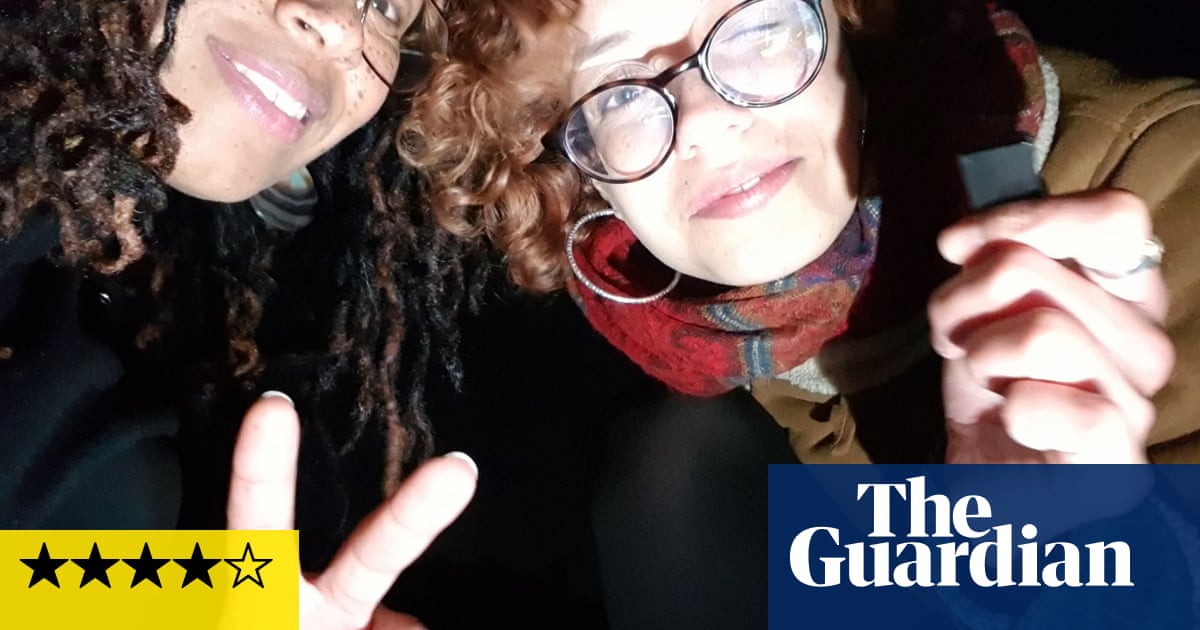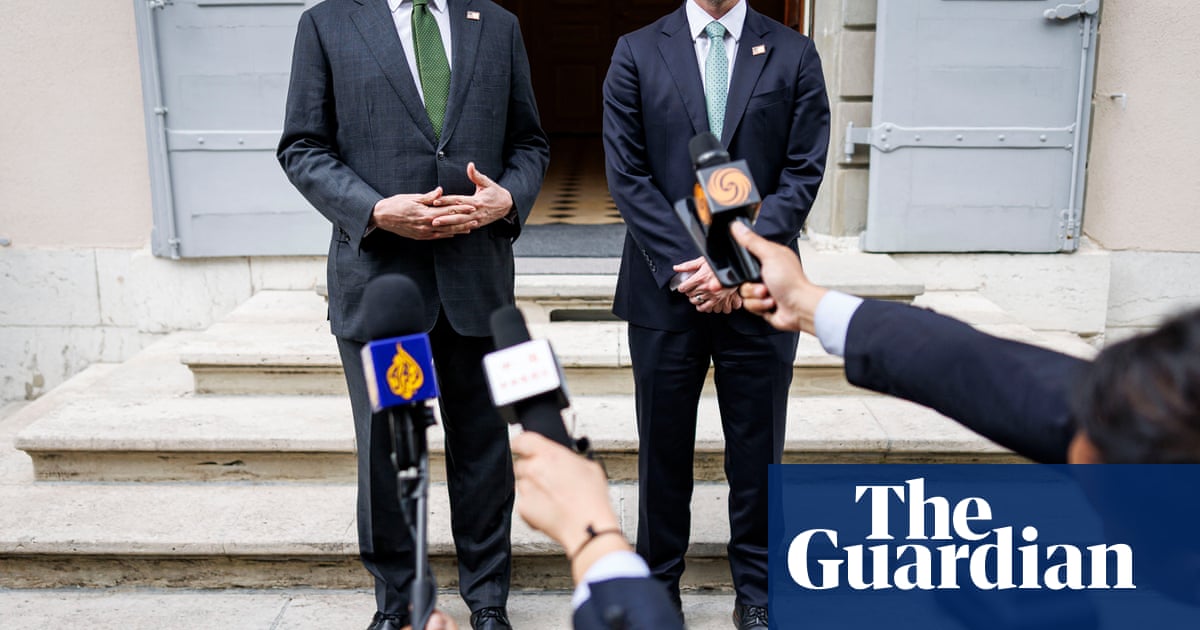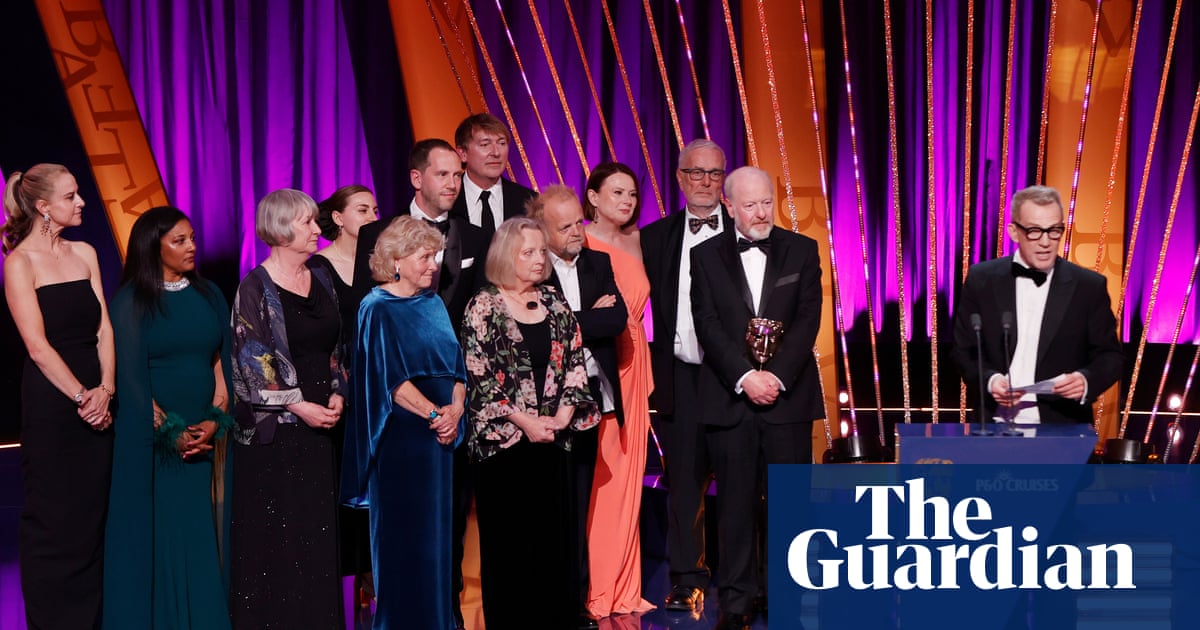The year 2023 was a tough one for Maren Morris. The country singer, then 33, reached the end of her tour for her third studio album, Humble Quest, and the end of her rope with the conservative politics of country music industry. Her marriage to fellow country singer-songwriter Ryan Hurd, with whom she shares a young son, fell apart. That summer, her future professional life in question and her personal life imploding, she found herself in the UK touring with the Chicks – three fellow trailblazing, outspoken female artists in a male-oriented music scene who, 20 years earlier, got infamously blacklisted from country radio for daring to criticize George W Bush during a concert at Shepherd’s Bush.
“It couldn’t have been a better musical hero backdrop for everything in my life crumbling,” Morris, a five-time Country Music Association Awards winner for such hits as The Bones, tells me in early April. The Chicks, of course, spun the hard-earned wisdom of the outsider’s high road into Grammy gold with 2006’s Taking the Long Way, an album of righteous anger burned to peace. “Any woman who has faced any sort of professional adversity or feeling that betrayal from a community – they just have the perfect album and attitude for it,” says Morris, with typical forthrightness.
Morris, too, went her own way that summer. By September, the Texas native – one of the few big country stars willing to call out peers for, say, anti-trans comments, excusing away a video of Morgan Wallen saying the N-word, or general refusal to reckon with racism, homophobia and sexism in Nashville – publicly distanced herself from the industry where she started a decade earlier as a scrappy songwriter. “I thought I’d like to burn it to the ground and start over,” she told the Los Angeles Times. “But it’s burning itself down without my help.” She released the two-track EP The Bridge, signifying her move to Columbia from the label’s Nashville division, with a music video that seemed to call out the racial vigilantism suggested by country star Jason Aldean’s Try That in a Small Town. A month later, she filed for divorce from Hurd after five years of marriage.
Two years of turmoil later, at 35, Morris can see a clearer picture. “I tried everything I could to make that part of myself work,” she says of her marriage. “I tried everything I could to make the part of myself within mainstream country work. And I think I was just growing apart from all of it.”
Things are much brighter these days, though we have escaped the scorching afternoon sun at Coachella’s record-hot first weekend for an air-conditioned trailer to discuss what emerged from the ashes: Dreamsicle, a honey-hued album of reckoning and healing, out this week. In person, Morris is poised and thoughtful, more circumspect than her past burn-it-down comments would suggest. True to her decade-plus career blurring the line between country and pop, she is dressed somewhere between Nashville and California – crochet halter top, denim cut-offs, cowboy boots, multicolor silk headscarf set. She’s in town for some coveted Coachella guest spots – revisiting her breakout country hit My Church with Gustavo Dudamel and the Los Angeles Philharmonic, performing her feature on Zedd’s inescapable 2018 party staple The Middle. And also, of course, to take in some wide-ranging sets, from Clairo to Charli xcx – with whom she shares, if nothing else, a career-long interest in the catharsis that is being loud while driving fast; her Grammy-winning single My Church, released in 2016, likened belting in the car to a religious experience, neatly twisting Nashville’s penchant for nostalgic faith into secular gospel.
As a debut, My Church evinced Morris’s independent streak, though she came up through the country music system. Raised on 90s female country-pop stars such as Shania Twain, the Chicks and LeAnn Rimes, she had no other plan than to become a singer. Relentless touring as a teen around the state, plus failed auditions for nearly every talent show – American Idol, The Voice, America’s Got Talent, Nashville Star – cemented her country-pop sensibility and vocal chops, if not a route out of Texas. On the advice of Kacey Musgraves, a friend from the Texas honky-tonk circuit, Morris moved to Nashville in 2013 to work as a songwriter for the likes of Kelly Clarkson; she met Hurd the same year, when they co-wrote Last Turn Home for Tim McGraw.
This was the height of so-called “bro country”, the prevalent sound of Solo cups, tailgates, cut-off jeans and nameless girls, almost all performed by white male artists occasionally inflected by hip-hop. As an aspiring solo artist, Morris was “deeply respectful to the machine” of Nashville, she told the New York Times Popcast in 2023. Her 2016 debut, Hero, emerged out of a period of questioning who she was writing for, then penning tracks for herself and posting them on Spotify, where she gained enough traction that country’s gatekeepers scrambled to sign her.

Hero immediately shot to No 1 on the country charts and solidified Morris’s precarious outsider-insider status as a new type of Nashville artist – musically voracious, open-minded and social media-literate, where she was unwilling to mince words on racial justice, abortion rights or respect for queer people. With a chameleonic and expansive voice, able to sustain torrential belt, delicate falsetto and a sharp turn of phrase, Morris moved seamlessly between genres and savvy collaborations, duetting with Taylor Swift, Alicia Keys, Hozier, Brothers Osborne and EDM artist Zedd – not to mention the Highwomen, a supergroup with Brandi Carlile, Amanda Shires and Natalie Hemby that served as a triumphant, rootsy rebuttal to the country manosphere.
Dreamsicle has that all in the rearview, instead preoccupied with present-tense mess given a rose-gold tint familiar to Morris’s ouevre. The album, named for the “perfectly fickle” sweet treat that definitionally cannot last, builds on her longstanding pop-lite sensibilities and stable of collaborators – Greg Kurstin, Jack Antonoff and Julia Michaels, among others – with the roving focus and intensity of someone in the thick of a breakup, broadly construed. “I’m not shying away from the elements of divorce on the record, but I think it’s so much bigger than that,” she says, lightly buffeted by the bass of Coachella’s early sets. “That’s a part of me and will be forever, but it’s not a defining characteristic of me. It’s how you put yourself back together.” Dreamsicle skips through those stops and starts – there is getting by with the help of your friends (grand bouquet), the awkwardness of the morning after with someone new (bed no breakfast), the moment of devastating clarity (this is how a woman leaves), the horniness of the newly liberated (push me over), and the overwhelmed freak-out (cut!).
What there is not is any direct jab at Hurd, with whom she co-parents their five-year-old son, Hayes, in Nashville. “We had this amazing love and we do in a different way now,” she says with the tranquility of the therapized. “Now we’re partners in a different sense. We have to be really good, on the same page as much as we can, as co-parents.”
Morris also seems intent on distancing herself from the story distancing herself from country music, describing the initial LA Times headline – “Maren Morris is getting the hell out of country music: ‘I’ve said everything I can say’” – as “really unfortunate”.
“I never said I’m leaving country music, because that’s not really how I feel at all,” she explains calmly. “You hear country music on this album. You can’t just intentionally take the parts away. There would be nothing left of the sound of me. Because it’s just there. It’s in my bones and it’s in the way I write.”
The story “caused a ton of unnecessary drama for me from that community because I was already sort of on the outs. I’m not backtracking what I said, I just never said that,” she adds, noting that she’s lived in Nashville for 12 years – “it’s not going to be some tussle that’s going to make me change my address.” Yes, she moved label divisions, no longer does the country radio circuit, nor submits her music to the CMA or ACM awards, but “I live in Nashville and I work with all my same friends,” she says. “It would be strange to be like: ‘This music isn’t me anymore.’ That makes me feel like I’m shitting on the music I’ve already put out, and that’s not how I feel at all.”
“The fans that I’ve made and the communities those fans have made through being a fan of my music is so important to me,” she continues, “so to ever come out of my mouth saying: ‘I’m leaving you behind’ – I’d never be so reckless and stupid.” When I ask what she wished the conversation would have been, a representative interjects – the focus, it’s clear, is onwards and upwards. But Morris clarifies that that was just two years ago, “very much inside the storm that was still brewing” v the “more zoomed-out, healed phase” now. “If you dive deep enough, or if you just listen to the album, it’s very clear that I haven’t left anything behind.”

Morris may not be up for directly challenging Nashville today, but she is clear on the values it should have, and what history is remembered. We’re in the Cowboy Carter era, where pre-existing mainstream stars from Beyoncé to Chappell Roan, Lana Del Rey to Post Malone, are taking on steel guitars and banjos. “It’s great when people come in and obviously have such a deep respect for the lore and the roots of country music, which people of color started,” Morris says. “Beyoncé telling the history of that in a correct way was so important.” Cowboy Carter’s collaborators, including Shaboozey, Rhiannon Giddens, Linda Martell, Brittney Spencer, Dolly Parton, Willie Nelson and others, “felt like this amazing melting pot of country music”, she adds. “That’s what it should be.”
For a genre, and a country, often so focused on invoking a fictional past, Morris offers a different tradition – the many collaborations between Ray Charles and Nelson, a favorite of hers growing up in Texas and evidence of country music’s multi-racial, genre-porous past. “It’s like, do people remember that that happened? That listen to mainstream country music now?” she wonders. “We’ve been doing this for a very long time. Or at least, really badass artists have.”
She offers others – Kris Kristofferson, an army man who advocated for veterans’ aid; Johnny Cash, performing for incarcerated people; Parton’s Imagination Library and status as a gay icon. “These people are famous for this long and this globally for a reason, and it’s not just because they’re from the south,” she says. “It’s because they have an identity and they stand up for the marginalized. They were real outlaws.
“If there’s any crisis [in country music], I think it’s that the people that have an issue with any of that forget that their heroes were talking about that stuff before they were born.” And with that, along with one more nod to an album of past heartache – “I hope [audiences] hear themselves in it, whether it’s a past self or who they want to be,” she says – we’re out of trailer, back into the light.
-
Dreamsicle is out now

.png) 19 hours ago
4
19 hours ago
4













































